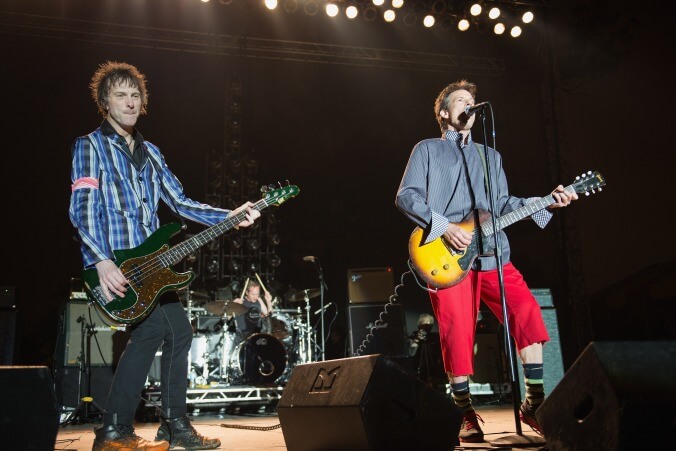Founder Mike Petryshyn on how this year's Riot Fest is even more of a retrospective than usual
Before the reunions and corndogs are upon us, we spoke to Petryshyn about what goes into the lineup every year and the best way to navigate the “most intimate” large music festival.
Tommy Stinson and Paul Westerberg at Riot Fest 2013 Photo: Daniel Boczarski/RedFerns
Before the reunions, nostalgia, and corndogs are upon us, The A.V. Club spoke to Petryshyn about what goes into the lineup every year, how even the scheduling tells a story, and the best way to navigate the “most intimate” large music festival if you’re new to it.
The A.V. Club: What are the most important elements that you keep in mind when you’re putting together the lineup every year?
Mike Petryshyn: I think at this point it’s pretty natural. I just go with my gut on things. I know who we are as a festival, what the fans want to see. I know the music, and I just trust myself and the other people here that the stuff we like, what we listen to, is pretty much what the fans want. It worked for 15 years in a way, so we got to stick with that calculus.
AVC: What is the split among the audience of younger fans who are discovering more established acts and longtime fans showing up for bands they might have already seen 30 times?
MP: I think it’s all the above. I don’t think it’s one or the other, it’s both. People go to see a reunion act or a final show or their favorite band doing an album play, but chances are they’re coming anyhow. When it comes to the kids coming, they’re usually there for liking a developmental band that’s popping or a band they latched onto a couple of years ago or something along those lines. I think Riot in and of itself is a little bit different in that a lot of people come just to come, and it’s a lot of familiar faces. People choose their festival or choose a concert based on bands, so to speak. I think the feel that we have, what we’ve become, alongside having, I think, a pretty good booking, is that people just come. It’s the environment. It’s everything. It’s a great crowd. I don’t know. I think it is the most intimate large festival out there. I think that’s attractive to a lot of people.
AVC: Do you think there’s an advantage to being so late in the festival schedule? Is the timing ideal for the type of festival you put together?
MP: We picked it initially when we decided to go outside. That’s around 2012. The thing is, June’s a weird month. You don’t know what you’re going to get weather-wise. July is Pitchfork, Lolla’s August, and we’re September. So we initially spin it out with that in mind to do it that way, but also, just weather-wise, September is for the most part in the 70s. It’s comfortable. It’s not a blazing 95 degrees outside. You get anomalies here and there, but generally it’s just a tad bit milder. It’s not humid, which makes festivals sometimes hard, for the bands.
AVC: You’ve described the lineups as telling a story, or trying to tell a story through the lineup. What story is this year’s lineup telling?
MP: There’s a couple of them. There’s our history—our story’s embedded in there, more so than any other year. Rise Against was our first headliner when [Riot Fest] first went outside. The Descendents have always been part of the family. They’re a band that played the club days with us. Same thing with Pennywise. You have Flaming Lips, who have done a bunch of—who played for us for, I don’t remember exactly how many, but enough to warrant that they’re part of the family for our 15th anniversary. Playing an album is pretty spectacular. You have Jawbreaker, a reunion band now from a few years ago. Slayer doing their final show. The last time we had Slayer was for our 10th anniversary: They played and they did Reign In Blood. It’s our story, our history. Even when we had to replace Die Antwoord [who were dropped from the Riot Fest lineup after yelling homophobic slurs at a fan during a concert], we replaced them with Wu-Tang Clan, who have played a bunch for us. This year is really like a lot of the previous years combined. We wanted to take elements of each year that came before it. You’re obviously gonna see Taking Back Sunday and GWAR and Andrew W.K. playing every year.
 Keep scrolling for more great stories.
Keep scrolling for more great stories.
